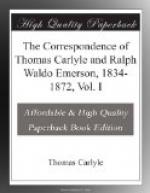We found, on computing, that there would be five good
volumes, including Teufelsdrockh. For an edition of Seven hundred and Fifty I demanded L50 a volume, and Fraser refused: the poor man then fell dangerously ill, and there could not be a word farther said on the subject; till very lately, when it again became possible, but has not yet been put in practice. All the world cries out, Why do you publish with Fraser? “Because my soul is sick of Booksellers, and of trade, and deception, and ‘need and greed’ altogether; and this poor Fraser, not worse than the rest of them, has in some sort grown less hideous to me by custom.” I fancy, however, either Fraser will publish these things before long; or some Samaritan here will take me to some bolder brother of the trade that will. Great Samuel Johnson assisted at the beginning of Bibliopoly; small Thomas Carlyle assists at the ending of it: both are sorrowful seasons for a man. For the rest, people here continue to receive that Revolution very much as you say they do there: I am right well quit of it; and the elderly gentlemen on both sides of the water may take comfort, they will not soon have to suffer the like again. But really England is wonderfully changed within these ten years; the old gentlemen all shrunk into nooks, some of them even voting with the young.—The American ill-printed Two and-a-half-dollars Copy shall, for Emerson’s sake, be welcomest to me of all. Kennet will send it when it comes.
The Oration did arrive, with my name on it, one snowy night in January. It is off to Madeira; probably there now. I can dispose of a score of copies to good advantage. Friend Sterling has done the best of all his things in the current Blackwood,— “Crystals from a Cavern,”—which see. He writes kind things of you from Madeira, in expectation of the Speech. I will gratify him with your message; he is to be here in May; better, we hope, and in the way towards safety. Miss Martineau has given you a luminous section in her new Book about America; you are one of the American “Originals,”—the good Harriet!
And now I have but one thing to add and to repeat: Be quiet, be quiet! The fire that is in one’s own stomach is enough, without foreign bellows to blow it ever and anon. My whole heart shudders at the thrice-wretched self-combustion into which I see all manner of poor paper-lanterns go up, the wind of “popularity” puffing at them, and nothing left erelong but ashes and sooty wreck. It is sad, most sad. I shun all such persons and circles, as much as possible; and pray the gods to make me a brick layer’s hodbearer rather. O the “cabriolets, neatflies,” and blue twaddlers of both sexes therein, that drive many a poor Mrs. Rigmarole to the Devil!*—As for me, I continue doing as nearly nothing as I can manage. I decline all invitations of society that are declinable: a London rout is one of the maddest things under the moon; a London dinner makes me sicker for a week, and I say often, It is better to be even dull than to be witty, better to be silent than to speak.




